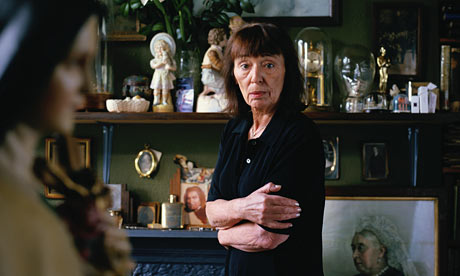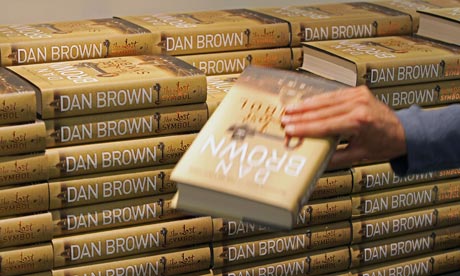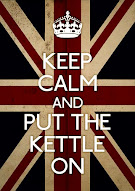Copies of Dan Brown's The Lost Symbol on sale in London. Photograph: Shaun Curry/AFP/Getty Images.
It was the year when poetry made the front pages - for good and bad reasons - when Dan Brown broke publishing records and when everyone from Mark Twain to Vladimir Nabokov brought out books from beyond the grave. We take a look back at the literary events that hit the headlines in 2009.
January
2009 was the year of Dan Brown, e-readers and poetic spats. Thankfully, Dan Brown is still a few months away, but the other two hit the ground running right at the start of the year. The first sales figures for the Sony e-reader are released and show that Waterstone's sold almost 30,000 of the readers since the launch in September, while downloads of electronic books from the chain's site passed the 75,000 mark. And the Oxford professor of poetry contest kicks off. Names under discussion at this stage include British poets Carol Ann Duffy, Andrew Motion, Simon Armitage, Jon Stallworthy, JH Prynne and John Wilkinson, along with Australian poet Les Murray, US poet Jorie Graham and New Zealand native Fleur Adcock. There is nary a mention of Ruth Padel and Derek Walcott. If only it was to stay that way ...
Meanwhile, Wendy Cope rules herself out of the running for the poet laureateship, calling it a poisoned chalice that should be abolished. In other, less fraught, poetry news, Jen Hadfield wins TS Eliot prize for poetry with her second collection, Nigh-No-Place. Sadly, the poet Mick Imlah, who was also shortlisted for the prize, dies this month, aged 52. We also say goodbye to Pulitzer prize-winning poet WD Snodgrass, Rumpole of the Bailey creator Sir John Mortimer and Rabbit writer John Updike. Neil Gaiman makes a start on what will be a vintage year by winning the Newbery for The Graveyard Book while Sebastian Barry wins the £25,000 Costa book of the year award. Joseph O'Neill only won plaudits for his novel about cricket and post-9/11 New York, Netherland, but it does turn out to have been the literary critics' read of choice last year.
2009 is also set to be the year of intriguing library news and it gets underway this month with the jailing, for two years, of an Iranian academic who stripped pages out of ancient books from the British Library.
Overseas, there's strife in Asterix world as Albert Uderzo's daughter, Sylvie, accuses the Asterix co-creator of betraying his hero, selling out to the businessmen and denying "all the values" she was brought up with - "independence, fraternity, conviviality and resistance" - after he authorised the series to continue after his death. He responds by calling her accusations "undignified" and an insult to Asterix readers. Turkey restores the citizenship of its most famous 20th-century poet, Nazim Hikmet, over 50 years after it branded him a traitor. And finally, Mills & Boon and the Rugby Football League team up to publish a series of books featuring tall, dark and handsome rugby heroes - minus cauliflower ears - and their glamorous love interests. They promise "jet-set locations, hunky alpha male heroes and hot sex, but in a rugby context."
February
James Patterson remains Britain's most borrowed author, with the top three positions unchanged from last year - Patterson is closely followed by children's author Jacqueline Wilson and the author of the Rainbow Magic series, Daisy Meadows. She may not get much in the way of public lending rights dosh, but JK Rowling can bask in with the adoration of the French – this month the country honours her with the title of knight of France's prestigious Legion of Honour. She also wins Stephen King's approval, albeit in comparison with Twilight's Stephenie Meyer. "The real difference is that Jo Rowling is a terrific writer and Stephenie Meyer can't write worth a darn. She's not very good," opined the horror writer, for whom it's a busy month: King also writes a novella, Ur, exclusively for the new version of Amazon's Kindle.
It's a good month for protests, too: Margaret Drabble lets rip about about WH Smith's new deal with BAA, which will see it running all the bookshops in BAA's seven UK airports and Margaret Atwood pulls out of the Dubai literary festival over the 'blacklisting' of Geraldine Bedell's The Gulf Between Us, before declaring that she had been misled, and agreeing to take part in a debate on censorship by video link. It is, as she herself puts it, a "dog's breakfast".
In poetry, Ruth Padel emerges as frontrunner for the prestigious post of Oxford University professor of poetry and Carol Ann Duffy is now odds-on favourite to get the laureateship.
In library news, the British Library spends £83,000 on The Tin Book, the futurist manifesto co-authored by a fascist-sympathising Italian artist who, 100 years ago, said all libraries should be destroyed.
There are wins for Julia Gregson with the romantic novel of the year award for East of the Sun and Naomi Klein with the inaugural Warwick prize for The Shock Doctrine.
We say a sad farewell to one of the best-known Arabic novelists of the 20th century, Sudanese writer Tayeb Salih, and Whitbread-winning author Christopher Nolan.
March
This month's controversy comes courtesy of Julie Myerson and her book, The Lost Child, which deals with the author's decision to lock her 17-year-old son, Jake, out of the family home over his use of cannabis. In a battle played out in the national newspapers, Jake describes his mother as "insane" and "obscene" and the book is published two months early due to the uproar. And uh-oh - Derek Walcott joins the Oxford professor of poetry race.
There is plenty of unexpected publishing news: lost Mark Twain stories are to be released, two new Roberto Bolaño manuscripts are found among his papers in Spain, and an unfinished David Foster Wallace novel, The Pale King, will be published. However, distinguished Russian scholar Orlando Figes's latest book on life under Stalin won't be published in Russia due to "political pressure".
This month's British Library story reveals that the library has "mislaid" 9,000 books with some not having been seen in well over half a century; the Bodleian, meanwhile, moves millions of books from dreamy Oxford to Swindon.
Matt Haig wins the Blue Peter award for Shadow Forest, controversial Egyptian novel Youssef Ziedan's Beelzebub wins the International Prize for Arabic fiction and Seamus Heaney wins the £40,000 David Cohen prize. The 2009-2014 World Outlook for 60-Milligram Containers of Fromage Frais wins the Diagram prize for the Oddest Book Title of the Year.
Ben Okri releases a new poem on Twitter and 65% of those polled in a survey admit lying about reading classic novels with Nineteen Eighty-Four coming top in a poll of the UK's guilty reading secrets. Finally, novelist Colm Toíbín tells it like it is when he says that the only aspect of the writing life that gives him any pleasure is getting paid.
April
Fancy living in Peach Pie Street? Wincanton in Somerset, twinned with Ankh-Morpork, names streets on a new housing estate after Terry Pratchett's fantasy series Discworld.
Birmingham plans the UK's largest ever lending library, and the earliest-known book jacket is discovered at the Bodleian.
Amazon finds itself at the centre of a censorship row after a number of gay and lesbian titles, by authors including Annie Proulx, EM Forster and Jeanette Winterson, were taken off the online sales charts. It was "embarrassing and hamfisted" said a shamefaced Amazon in a suitably grovelling apology. A Pride and Prejudice and Zombies 'mash-up' becomes an unexpected bestseller, and the Espresso Book Machine, which can print any of 500,000 titles while you wait, is launched in Blackwell's in London. Margaret Drabble announces that she will not write another novel because she is worried about repeating herself.
There are SF wins for Ursula K Le Guin, who gets her sixth Nebula, while the Arthur C Clarke award goes to Ian R MacLeod's Song of Time. The SF world has a big loss with the death of JG Ballard and we also say goodbye to poet UA Fanthorpe. There are no poetic barneys this month but don't worry – May is a biggie.
May
It all starts decorously enough in the poetry world, with near-universal support for the appointment of Carol Ann Duffy as the first female poet laureate. And then that pesky poetry professorship contest has to go and ruin everything. As the fiasco reaches its climax, Derek Walcott resigns from the race after earlier sexual harassment claims made against him were brought up via an anonymous letter campaign. Oxford refuses calls to postpone the election and Ruth Padel is elected the first female Oxford professor of poetry. She spends the next week fighting to keep her post after it emerges that she tipped off newspapers about claims of sexual impropriety against Walcott, but finally resigns, at the Hay festival, less than 10 days after her election. Oxford university calls for "a period of reflection" and accepts that it is unlikely that it will have anybody in the post by October when the current incumbent steps down.
The tawdry affair rather overshadowed Alice Munro's well-deserved win of the £60,000 Man Booker international prize, and a Hay festival which saw Rowan Williams and Desmond Tutu call for quiet and tolerance, Sarah Waters apologise for not putting any lesbians in her new novel, The Little Stranger, Kamila Shamsie make connections across the whole of the 20th century and Joan Bakewell return with her first novel.
Elsewhere, Jonathan Ross launches a Twitter book club and sends his first choice soaring up the bestseller charts (but it all seemed to have petered out by the summer), Geoff Dyer wins the Wodehouse prize for comic fiction with Jeff in Venice, Death in Varanasi, and we bid farewell to novelist Marilyn French.
June
Poetry continues to generate controversy, as Carol Ann Duffy chooses as her first subject for a poem as laureate - the MPs' expenses scandal and the corrosiveness of politics on politicians. However, there is also the discovery of Timmy the Tug, a 40-page children's poem written by Ted Hughes in the 1950s. Two unpublished Poirot short stories are also found in Agatha Christie's holiday home.
JD Salinger launches legal action against an author who has purportedly written a spinoff "sequel" to Catcher in the Rye, 60 Years Later: Coming Through the Rye.
This month's library news is fun - the British Library's head of modern manuscripts agrees to help with haymaking on John Berger's French farm in return for the donation of the author's literary archive.
Anthony Browne becomes the children's laureate, the Carnegie Medal is posthumously awarded to Siobhan Dowd for Bog Child, Marilynne Robinson wins Orange prize and Philip Hoare's study of whales, Leviathan, wins the Samuel Johnson prize. Debut novelist Michael Thomas beat authors including Philip Roth, Doris Lessing and Joyce Carol Oates to take the €100,000 (£85,000) Impac Dublin prize.
We said goodbye to fantasy author David Eddings.
July
A quiet month in the books world, but a "sad day for the world of smut" as the women's erotica imprint Black Lace stops commissioning new titles. All is not lost, however: Playboy acquires the first serial rights to The Original of Laura, the unfinished novel Nabokov wanted to be destroyed.
Ernest Hemingway is unveiled as a failed KGB spy.
There were goodbyes to Frank McCourt, father of the misery memoir, novelist Gordon Burn and Booker-winner Stanley Middleton.
August
Much summer silliness on offer as the literati try to guess who inspired Sebastian Faulks to create an embittered literary reviewer whose only joy in life is to destroy the careers of authors by writing excoriating reviews of their books in national newspapers, in his novel A Week in December. But the novelist also has to defuse a row after he is quoted in an interview dismissing the Qu'ran as "just the rantings of a schizophrenic" with "no ethical dimension". Bloomsbury also lands in hot water after Australian author Justine Larbalestie's new novel, Liar, about a short-haired black girl called Micah, is published with a photograph of a long-haired white girl on its jacket. The news that William Golding's private papers, which he gave to his biographer John Sunderland, reveal that he tried to rape a 15-year-old girl as a teenager, is met with shock. Travel writers are furious as the Office of Fair Trading decides against investigating WH Smith's deal to stock only Penguin's overseas guides at its travel stores.
Dan Brown may have topped Oxfam's list of most donated books but there are no Robert Langdon adventures on Obama's holiday reading list which, we learn, contains the rather more high-powered Thomas L Friedman's Hot, Flat and Crowded – subtitled Why We Need a Green Revolution, and How It Can Renew America – and Pulitzer prize-winner David McCullough's biography of the second US president, John Adams. Wuthering Heights tops the classics bestseller lists after it is repackaged as the 'favourite book' of Stephenie Meyer's Bella and Edward with a cover styled on her Twilight series.
Neil Gaiman's run of success with the Graveyard Book continues with a Hugo award, and Michael Holroyd wins the James Tait Black prize for his book about 19th-century Shakespearean actors, A Strange Eventful History, 42 years after his wife Margaret Drabble won it.
September
September sees the announcement of the Man Booker shortlist, which pits Hilary Mantel, AS Byatt and Sarah Waters against JM Coetzee, Simon Mawer and Adam Foulds, but it's fair to say that the month belongs Dan Brown. The Lost Symbol is published and becomes the best-read adult novel in publishing history, setting adult fiction sales records despite being a steaming pile of clunk. Thankfully, one poll Brown doesn't top is "the piece of writing that has most shaped world literature over the past 25 years": Gabriel García Márquez's novel One Hundred Years of Solitude gets that one.
A Google doodle honours HG Wells in a mysterious way but the search engine's $125m deal agreement with US publishers to digitise millions of books is postponed by a judge after widespread criticism. Some upbeat library news: readers can now borrow books from more than 4,000 public libraries regardless of where they live.
Simon Van Booy wins the €35,000 Frank O'Connor award for Love Begins in Winter, Graham Joyce wins the British Fantasy award with Memoirs of a Master Forger and poet Tony Harrison is awarded the first ever PEN/Pinter prize for a writer following in Harold Pinter's footsteps. We bid farewell to Keith Waterhouse.
October
The Booker goes to Hilary Mantel for Wolf Hall and she briefly pushes Dan Brown into second place on Amazon's sales charts.
The Google digital library row rumbles on with the German chancellor Angela Merkel coming out against it, while Amazon launches the Kindle.
A Winnie the Pooh sequel sees Christopher Robin back in Hundred Acre Wood, and a film adaption of Where the Wild Things Are that leads the book's author Maurice Sendak to tell parents worried that is too frightening for children to "go to hell". Also going to hell, as far as the US religious right are concerned, are readers of And Tango Makes Three. The story of two male penguins raising an orphaned chick tops the US banned books list but also races up the Amazon charts.
The familial upsets of earlier in the year are put to one side as Asterix turns 50 and France celebrates in style.
Don Paterson wins the Forward prize for poetry with his collection Rain, TS Eliot is named the nation's favourite poet, Herta Müller wins the Nobel prize for literature and Mal Peet wins the Guardian children's fiction prize.
November
More poetry shenanigans as Andrew Motion defends his use of 'found' material in a poem against a charge of plagiarism and Nicolas Sarkozy provokes the French left by mischievously suggesting he bestow the country's greatest posthumous honour upon Albert Camus - transferring the Algerian-born author's remains to the Panthéon, the resting place for heroes of France, on the 50th anniversary of his death in January.
The new Nobel laureate comes under fire from a former member of the Romanian secret police who admits spying on her but claims that the writer "has a psychosis and has no contact with external reality." There's much excitement as upmarket callgirl blogger Belle Du Jour unmasks herself as a research scientist, and some potentially cheering news as Stephenie Meyer admits to Oprah that she is "a little burned out on vampires" and may not write another Twilight novel. The latest move in the Google books battle sees the search giant offering some concessions.
This month we learn that Roberto Bolaño would rather have been a cop than an author, that Sarah Palin's Going Rogue has actually managed to sell quite a few copies and Stephen King is plotting a sequel to The Shining.
More library loveliness as a former telephone box is transformed into a mini village library. It's happy 30th birthday to the London Review of Books and more celebrations for Neil Gaiman as The Graveyard Book picks up yet another gong, this time the Booktrust teenage prize. Su Tong's political fable The Boat to Redemption takes the Man Asia literary prize, Evie Wyld's debut After the Fire, a Still Small Voice beats Aravind Adiga and Chimamanda Ngozi Adichie to the John Llewellyn Rhys prize and Philip Ardargh's Grubtown Tales wins the Roald Dahl funny prize. The American winner of the Prix Goncourt, Jonathan Littell, wins the Bad Sex award for such inspired lines as "I came suddenly, a jolt that emptied my head like a spoon scraping the inside of a soft-boiled egg" in his novel The Kindly Ones.
And it's goodbye Borders, as the bookstore goes into administration.
December
Petina Gappah wins the Guardian first book award with her collection of short stories about Zimbabwe, An Elegy for Easterly, and poet Kate Clanchy wins the BBC National Short Story award.
Otherwise, the year ends as it starts – with poets, Dan Brown, Google and e-books. Oxford university announces that it will reform voting rules for the poetry professor post, but it's too late for Derek Walcott: he's already accepted the post of professor of poetry – at Essex. Dan Brown is Christmas number one, Ursula K Le Guin accuses the Authors Guild of 'deal with the devil' over its Google settlement, and Amazon customers bought more e-books than printed books for the first time on Christmas Day.
New words this year included jeggings, tweetups, staycation and the absolutely splendid snollygosters.
All in all, 2009 was quite a year. Fasten your seatbelts for the sequel ...
---
Michelle Pauli, The Guardian, Wednesday 30 December 2009








.jpg)




 Who could it be? Danielle Steele? Stephen King? Oprah?
Who could it be? Danielle Steele? Stephen King? Oprah?



.jpg) Bookhabit.com
Bookhabit.com









 Check out my novel
Check out my novel 


.jpg)


croppedsidebar.jpg)

.png)
















